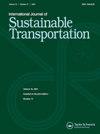Impacts of electric vehicles on traffic-power systems: A review
IF 3.1
3区 工程技术
Q2 ENVIRONMENTAL STUDIES
International Journal of Sustainable Transportation
Pub Date : 2025-02-01
DOI:10.1080/15568318.2024.2449436
引用次数: 0
Abstract
This article offers a comprehensive summary of the profound impacts stemming from the integration of electric vehicles (EVs) into traffic-power systems. While the introduction of EVs promises to curtail greenhouse gas (GHG) emissions within the automotive sector, it could trigger a cascade of effects across the intertwined traffic-power system. These ramifications manifest in several key areas, including (i) shifts in driver behavior and route choice, (ii) alterations in energy consumption patterns, (iii) the expansion and placement of charging infrastructure, and (iv) the evolving demands placed on the electric grid. Although the current penetration rate of EVs remains relatively low, their increasing presence on the road will inevitably amplify these consequences, leading to altered traffic dynamics, more conservative driving behavior to reduce energy consumption, and an uptick in electricity demand during charging periods. This review meticulously summarizes the multifaceted effects of EV integration in these domains and outlines various strategies and technologies aimed at mitigating these challenges. These include eco-driving techniques that leverage intelligent vehicle controls to minimize energy consumption, innovative charging schemes to flatten the electricity demand curve, and the implementation of vehicle-to-everything (V2X) communication enabling vehicles to better respond to their surroundings, among others. In summary, this review seeks to consolidate the current academic consensus regarding EV performance within the integrated traffic-power network while paving the way for future research directions in this dynamic field.
电动汽车对交通电力系统的影响:综述
本文全面总结了电动汽车(ev)与交通电力系统集成所产生的深远影响。虽然电动汽车的引入有望减少汽车行业的温室气体排放,但它可能会在错综复杂的交通-电力系统中引发一系列影响。这些影响体现在几个关键领域,包括(i)驾驶员行为和路线选择的转变,(ii)能源消耗模式的改变,(iii)充电基础设施的扩展和安置,以及(iv)对电网的不断变化的需求。尽管目前电动汽车的普及率仍然相对较低,但它们在道路上的出现将不可避免地放大这些后果,导致交通动态的改变,更保守的驾驶行为以减少能源消耗,以及充电期间电力需求的上升。本文精心总结了电动汽车集成在这些领域的多方面影响,并概述了旨在缓解这些挑战的各种策略和技术。其中包括利用智能车辆控制来最大限度地减少能源消耗的生态驾驶技术,创新的充电方案来平坦电力需求曲线,以及车辆对一切(V2X)通信的实施,使车辆能够更好地响应周围环境,等等。综上所述,本文旨在巩固目前关于电动汽车在综合交通-电力网络中的性能的学术共识,同时为这一动态领域的未来研究方向铺平道路。
本文章由计算机程序翻译,如有差异,请以英文原文为准。
求助全文
约1分钟内获得全文
求助全文
来源期刊
CiteScore
8.90
自引率
2.60%
发文量
56
期刊介绍:
The International Journal of Sustainable Transportation provides a discussion forum for the exchange of new and innovative ideas on sustainable transportation research in the context of environmental, economical, social, and engineering aspects, as well as current and future interactions of transportation systems and other urban subsystems. The scope includes the examination of overall sustainability of any transportation system, including its infrastructure, vehicle, operation, and maintenance; the integration of social science disciplines, engineering, and information technology with transportation; the understanding of the comparative aspects of different transportation systems from a global perspective; qualitative and quantitative transportation studies; and case studies, surveys, and expository papers in an international or local context. Equal emphasis is placed on the problems of sustainable transportation that are associated with passenger and freight transportation modes in both industrialized and non-industrialized areas. All submitted manuscripts are subject to initial evaluation by the Editors and, if found suitable for further consideration, to peer review by independent, anonymous expert reviewers. All peer review is single-blind. Submissions are made online via ScholarOne Manuscripts.

 求助内容:
求助内容: 应助结果提醒方式:
应助结果提醒方式:


